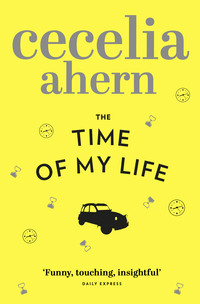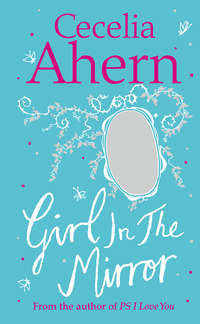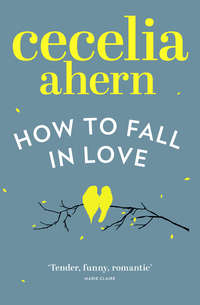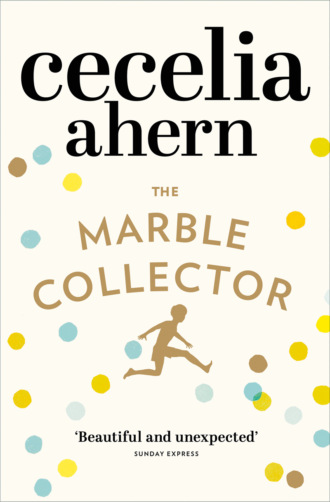
Полная версия
The Marble Collector: The life-affirming, gripping and emotional bestseller about a father’s secrets
It is rare that I find myself alone in the house; in fact I can’t remember the last time that happened, no kids around asking me to do something every two seconds. I don’t know what to do with myself so I sit in the empty, silent kitchen looking around. It’s ten a.m. and the day has barely started. I make myself a cup of tea, just for something to do, but don’t drink it. I stop myself just in time from putting the teabags in the fridge. I’m always doing things like this. I look at the pile of washing and ironing but can’t be bothered. I realise I’ve been holding my breath and I exhale.
There are things that I need to do all the time. Things that I never have the time for in my carefully ordered daily routine. Now I have some time – the whole day – but I don’t know where to start.
My mobile rings, saving me from indecision, and it’s my dad’s hospital.
‘Hello?’ I say, feeling the tightness in my chest.
‘Hi, Sabrina, it’s Lea.’ My dad’s favourite nurse. ‘We just got a delivery of five boxes for Fergus. Did you arrange it?’
‘No,’ I frown.
‘Oh. Well, I haven’t shown them to him yet, they’re sitting in reception, I wanted to wait to speak with you first, just in case, you know, there’s something in there that might confuse him.’
‘Yes, you’re right, thanks. Don’t worry. I’ll come get them now, I’m free.’
And that’s what always seems to happen. Whenever I get a minute to myself away from work and the kids, Dad is the other person who fills it. I arrive at the hospital thirty minutes later and see the boxes piled in the corner of reception. Upon seeing them I know immediately where they’ve come from and I’m raging. These are the boxes of Dad’s belongings that I packed after Dad’s home was sold. Mum had been storing them, but she’s obviously chosen not to any more. I don’t understand why she sent them here and not to me.
Last year my dad suffered a severe stroke, which has led to his living in a long-term care facility, giving him the kind of skilled care that I know I could not have given with three young boys – Charlie at seven, Fergus at five and Alfie at three years old – and a job. Mum certainly wouldn’t have taken on the role either as she and Dad are divorced, and have been separated since I was fifteen. Though right now they’re getting along better than they ever have, and I even think Mum enjoys her fortnightly visits with him.
There are those who insist that stress does not cause strokes, but it happened during a time when Dad was the most stressed in his life, coping with the fallout of the financial crisis. He worked for a venture capital company. He scrambled for a while, trying to find new clients, trying to win old ones back, and all the while watching lives fall apart and feeling responsible for that, but it wasn’t sustainable. Eventually he found a new job, in car sales, was trying to move on, but his blood pressure was high, his weight had ballooned, he smoked heavily, didn’t exercise, and drank too much. I’m no doctor, but he did all of these things because he was stressed, and then he had a stroke.
His speech isn’t easy to understand and he’s in a wheelchair, though he’s working on his walking. He’s lost an enormous amount of weight, and seems like a completely different man to the man he was in the years leading up to his stroke. The stroke caused some memory problems, which enrages Mum. He seems to forget all the hurt he caused her. He has been able to wipe the slate clean of all of their problems and arguments, their heartache and his misdemeanours – of which there were many – throughout their marriage. He comes out of it smelling of roses.
‘He gets to live like none of it happened, like he doesn’t have to feel guilty or apologise for anything,’ Mum regularly rants. She was obviously planning on him feeling bad for the rest of his life and he went and ruined it. He went and forgot it all. But even though she rants about the Fergus before the stroke, she visits him regularly and they talk like the couple they both wish they’d been. About what’s happening in the news, about the garden, the seasons, the weather. It’s comforting chat. I think what angers her most is the fact that she likes him now. This sweet, caring, gentle, patient man is a man she could have remained married to.
What has happened to Dad has been difficult, but we haven’t lost him. He is still alive and in fact what we lost was the other side of him, the distant, detached, sometimes prickly side of him that was harder to love. The one that pushed people away. The one that wanted to be alone, but have us at the end of his fingertips, just in case, for when he wanted us. He is quite content where he is now; he gets along with the nurses, has made friends, and I spend more time with him now than I ever have, visiting him with Aidan and the boys on Sundays.
I never know what exactly Dad has forgotten until I bring something up and I watch that now all too familiar fog pass over his eyes, that vacant look as he tries to process what I’ve just said with his collection of memories and experiences, only to find it coming back empty, as if they don’t tally. I understand why Nurse Lea didn’t bring the boxes directly to him; an overload of too many things that he can’t remember would surely upset him. There are ways to deal with those moments. I gently sidestep them, move on from them quickly as though they never happened, or pretend that I’ve gotten the details wrong myself. It’s not because it upsets him – most of the time it goes by without drama, as if he’s oblivious to it – but it upsets me.
There are more boxes than I remember and, too impatient to wait until I get home, I stand there in the corridor and use a key to pierce through the tape on the top of one of the boxes and slice it open. I fold back the box, curious to see what’s inside. I expect photo albums, or wedding cards. Something sentimental that, far from conjuring beautiful memories, starts Mum spouting about everything that was taken from her by her own husband. The dreams that were shattered, the promises that were broken.
Instead I find a folder containing pages covered in handwriting: my dad’s looping, swirling letters, that remind me of school sick notes and birthday cards. At the top of the page it says Marbles Inventory. Beneath the folder are tins, pouches and boxes, some in bubble wrap, others in tissue paper.
I open some of the lids. Inside each tin or box are deliciously colourful candy-like balls of shining glass. I look at them in utter shock and amazement. I had no idea my dad liked marbles. I had no idea my dad knew the slightest thing about marbles. If it wasn’t for his handwriting in the inventory, I would have thought there was a mistake. It is as if I have opened a box to somebody else’s life.
I open the folder and read through the list, which is not as sentimental as it first seemed. It is almost scientific.
The pouches – some velvet, others mesh – and the tin boxes are colour-coded and numbered with stickers, to save confusion, and adhere to the colours on the inventory.
The first on the list is a small velvet pouch of four marbles. The inventory lists them as Bloodies and, beside that, (Allies, Fr. Noel Doyle). Opening the pouch, the marbles are smaller than any others I can see offhand and have varying red swirls, but Dad has gone into detail describing them:
Rare Christensen Agate ‘Bloodies’ have transparent red swirls edged with translucent brown on an opaque white base.
There is a cube box of more bloodies, dating back to 1935 from the Peltier Glass Company. These are appropriately colour-coded red and are listed together with the velvet pouch. I scoop a few marbles into my hands and roll them around, enjoying the sound of them clicking together, while my mind races at what I’ve discovered. Pouches, tins, boxes, all containing the most beautiful colours, swirls and spirals, glistening as they catch the light. I lift some out and hold them up to the window, examining the detail inside, the bubbles, the light, utterly enchanted by the complexity within something so small. I flick through the pages quickly:
… latticinia core swirls, divided core swirls, solid core swirls, ribbon core swirls, joseph’s coat swirls, banded/coreless swirls, peppermint swirls, clambroths, banded opaques, indian, banded lutz, onionskin lutz, ribbon lutz …
A myriad of marbles, all of them alien to me. What is even more astonishing is that in other pages of his handwritten documents he has included a table charting each marble’s value depending upon how it measures up in terms of size, mint, near mint, good, collectable. It seems that his humble box of bloodies are worth $150–$250.
All of the prices are listed in US dollars. Some are valued at fifty dollars or one hundred, while the two-inch ribbon lutz has been priced at $4,500 in mint condition, $2,250 in near mint, $1,250 in good condition and collectable is $750. I know next to nothing about their condition – all of them appear perfect to me, nothing cracked or chipped – but there are hundreds of them packed away, and pages and pages of inventory. What Dad appears to have here are thousands of dollars’ worth of marbles.
I stop and think. All around me are the sounds and smells of the care home and it transports me from the parallel marble world back to reality. I was worried about him being able to pay for his hospital costs but if his pricing is correct, then he has his nest egg right here. I’m always worried about those bills. We have no way of knowing when he might need another operation or new medicine, or a new physio. It’s always changing, the bills are always climbing and the proceeds from the sale of his apartment didn’t go far after paying his mortgage and numerous debts. None of us had known that he was in such a bad financial state.
His writing is impeccable, a beautiful flowing script; he hasn’t made one mistake and if he did I imagine he started the page over. It is written with love, it has taken great time and dedication, research and knowledge. That’s it: it’s written by an expert. It’s the writing of another man, not the one who now grasps the pen with great difficulty, but neither does it fit with the father I knew, whose only hobby seemed to be watching and talking about football. Wanting to take my time to go through the boxes at home, I pack everything away again and Gerry, the porter, helps me carry them to my car. But before locking them in the boot, I hesitate and take out the small bag of red marbles.
Dad is sitting in the lounge, drinking a cup of tea and watching Bargain Hunt. He watches the show every day: people searching for items at markets and then trying to auction them for as much as possible. Maybe there have been hints of his passion all the way along and I missed them. I think of the inventory and wonder if I should go back for it. As I watch him staring intently at the pricing of these old objects, I wonder if in fact he does remember exactly what is in those boxes after all. He sees me before I have time to think about it any further and so I go to him, to his smiling face. It breaks my heart how happy he is to receive visitors, not because he’s lonely but because he could often be so irritated by others before, unless it was to convince them to buy something from him, and he now can’t get enough of people’s company, for nothing in return.
‘Good morning.’
‘Ah, to what do I owe this pleasure?’ he asks. ‘No work today?’
‘Eric let me off early,’ I explain diplomatically. ‘And Lea called me. She said it was an emergency, that you were revving up the inmates, trying to organise a breakout again.’
He laughs, then he looks down at my hands and his laughter stops immediately. I’m holding the bag of red marbles. Something passes on his face. A look I’ve never seen before. As quickly as it arrived, it’s gone again and he’s smiling at me, the confusion back.
‘What’s that you’ve got there?’
I open my hand, reveal the red marbles in the mesh bag.
He just stares at them. I wait for him to say something but nothing comes. He barely blinks.
‘Dad?’
Nothing.
‘Dad?’ I put my free hand on his arm gently.
‘Yes.’ He looks at me, troubled.
I loosen the drawstrings on the mesh purse and roll them into the palm of my hand. As I move the marbles in my hand they roll and click together. ‘Do you want to hold them?’
He stares at them again, intently, as though trying to figure them out. I want to know what’s going on inside his head. Too much? Everything? Nothing? I know that feeling. I watch for that sliver of recognition again. It doesn’t come. Just bother and irritation, perhaps that he can’t remember what he wants to remember. I stuff the marbles in my pocket quickly and change the subject, trying to hide my disappointment from him.
But I saw it. Like a flicker of a flame. The ruffle of a feather. The flash of the sea as the sun hits it. Something brief and then gone, but there. When he saw the marbles first, he was a different man, with a face I’ve never seen.
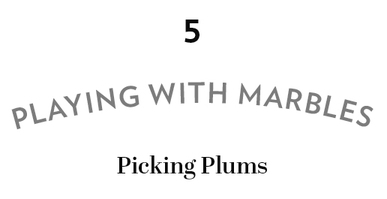
I’m home from school, a fever, the first and only day of school I’ve ever missed. I hate school; I would have wanted this any day at all in the whole entire year. Any day but today. The funeral was yesterday – well, it wasn’t a proper one with a priest, but Mattie’s pal is an undertaker and he found out where they were burying our baby sister, in the same coffin as an old woman who had just died in the hospital. When we got to the graveyard, the old woman’s family were finishing up their funeral so we had to wait around. Ma was happy it was an old woman she was being buried with and not an old man, or any man. The old woman was a mother, and a grandmother. Mammy spoke to one of her daughters who said that her ma would look after the baby. Uncle Joseph and Aunty Sheila said all the prayers at our ceremony. Mattie doesn’t say prayers, I don’t think he knows any, and Mammy couldn’t speak.
The priest called round to the house beforehand and tried to talk Mammy out of making a show of herself by going to the grave. Mammy had a shouting match with him and Mattie grabbed the brandy from the priest’s hand and told him to get the fuck out of his house. Hamish helped Mattie get rid of him, the only time I’ve seen them on the same side. I saw the way everyone looked at Mammy as we walked down the street to the graveyard, all dressed in black. They looked at her like she was crazy, like our baby sister was never really a baby at all, just because she didn’t take a breath when she came out. Even though they’re not supposed to, the midwife had let Mammy hold her baby after she was born. She held her for an hour, then when the midwife started to get a bit angry and tried to take her from Mammy, Hamish stepped in. Mattie wasn’t there and he took over, he lifted the baby out of Mammy’s arms and carried her down the stairs. He kissed her before he gave her back to the midwife, who took her away forever.
‘She was alive inside of me,’ I heard Mammy say to the priest, but I don’t think he liked hearing her say that. He looked like it was a bit disgusting for him to think of things living inside of her. But she did it anyway, made up her own funeral at the graveyard, and it was cold and grey and it rained the whole time. My shoes got so wet, my socks and feet were soaking and numb. I sneezed all day, couldn’t breathe out of my nose last night, the lads kept thumping me to stop me snoring and I spent the whole night going from hot to cold, shivering then sweating, feeling cold when I was sweating, feeling hot when I was cold. Crazy dreams: Da and Mattie fighting, and Father Murphy shouting at me about dead babies and hitting me, and my brothers stealing my marbles, and Mammy in black howling with grief. But that part was real.
Even though I feel like my skin is on fire and everything around me is swirling, I don’t call Mammy. I stay in bed, tossing and turning, sometimes crying because I’m so confused and my skin is sore. Mammy brought me a boiled egg this morning and put a cold cloth on my head. She sat beside me, dressed in black, still with a big tummy looking like she has a baby in there, staring into space but not saying anything. It’s kind of like when Da died but this is different; she was angry at Da, this time she’s sad.
Usually Mammy never stops moving. She’s always cleaning, cleaning Bobby’s nappies, the house, banging sheets and rugs, cooking, preparing food. She never stops, always banging around the place, us always in her way and her moving us out of the way with her legs and feet, pushing us aside like she’s in a field and we’re long grass. Now and then she stops moving to straighten her back and groan, before going back to it again. But today the house is silent and I’m not used to that. Usually we’re all shouting, fighting, laughing, talking; even at night there’s a child crying, or Mammy singing to it, or Mattie bumping into things when he comes home drunk and swearing. I hear things that I’ve never heard before like creaks and moaning pipes, but there’s no sound from Mammy. This worries me.
I get out of bed, my legs shaking and feeling weak like I have never walked before, and I hang on tight to the bannister as I go downstairs, every floorboard creaking beneath my bare feet. I go into the living room, joined on to the kitchen, tiny at the back of the house like they forgot it and added it on, and it’s empty. She’s not here. Not in the kitchen, not in the garden, not in the living room. I’m about to leave when I suddenly see her in black sitting in an armchair in the corner of the living room that only Mattie ever sits in; so still I nearly missed her. She’s staring into space, her eyes red like she hasn’t stopped crying since yesterday. I’ve never seen her so still. I don’t remember it ever being just me and her before, just the two of us. I’ve never had Mammy to myself. Thinking about it makes me nervous: what do I say to Mammy when there’s nobody around to hear me, to see me, to react, to tease, to goad, to impress? What do I say to Mammy when I’m not using her to get a rise out of someone else, to tell on someone, or know if what I’m saying is right or wrong because of their reactions?
I’m about to leave the room when I think of something, something I want to ask, that I would only ask if it was just me and her, with no one else around.
‘Hi,’ I say.
She looks over at me, surprised, like she’s had a fright, then she smiles. ‘Hi, love. How’s your head? Do you need more water?’
‘No thanks.’
She smiles.
‘I want to ask you a question. If you don’t mind.’
She beckons me in and I come closer and stand before her, fidgeting with my fingers.
‘What is it?’ she asks gently.
‘Do you … do you think she’s with Da?’
This seems to take her by surprise. Her eyes fill and she struggles to talk. I think if the others were here I wouldn’t have asked such a stupid question. I’ve gone and upset her, the very thing Mattie told us not to do. I need to get myself out of it before she yells or, worse, cries.
‘I know he’s not her da, but he loved you, and you’re her mammy. And he loved children. I don’t remember loads about him but I remember that. Green eyes and he always played with us. Chased us. Wrestled us. I remember him laughing. He was skinny but he had huge hands. Some other das never did that, so I know he liked us. I think she’s in heaven and that he’s minding her and so I don’t think you need to worry about her.’
‘Oh, Fergus, love,’ she says, opening her arms as tears run down her face. ‘Come here to me.’
I go into her arms and she hugs me so tight I nearly can’t breathe but am afraid to say. She rocks me, saying, ‘My boy, my boy,’ over and over again, and I think I might have said the right thing after all.
When she pulls away I say, ‘Can I ask you another question?’
She nods.
‘Why did you call her Victoria?’
Her face creases again, in pain, but she composes herself and even smiles. ‘I haven’t told anyone why.’
‘Oh. Sorry.’
‘No, pet, it’s just that nobody asked. Come here and I’ll tell you,’ she says, and even though I’m too old, I squeeze onto her lap, half on the armchair, half on her. ‘I felt different with her. A different kind of bump. I said to Mattie, “I feel like a plum.” Says he, “We’ll call her Plum, so.”’
‘Plum!’ I laugh.
She nods and wipes her tears again. ‘It got me thinking about my grandma’s house. We used to visit her: me, Sheila and Paddy. She had apple trees, pears, blackberries, and she had two plum trees. I loved those plum trees because they were all she talked about, I think they were all she thought about – she wouldn’t let those trees beat her.’ She gives a little laugh and even though I don’t get the joke, I laugh too. ‘I think she thought it was exotic, that growing plums made her exotic, when really she was plain, plain as can be, like any of us. She’d make plum pies and I loved baking them with her. We stayed with her on my birthday every year, so every year my birthday cake was a plum pie.’
‘Mmm,’ I say, licking my lips. ‘I’ve never had plum pie.’
‘No,’ she says, surprised. ‘I’ve never baked it for you. She grew Opal plums, but they weren’t reliable because the bullfinches ate the fruit buds in winter. They used to strip those branches clean and Nana would be crazy, running around the garden swatting them with her tea cloth. Sometimes she’d get us to stand by the tree all day just scaring them away; me, Sheila and Paddy, standing around like scarecrows.’
I laugh at that image of them.
‘She gave the Opal more attention because it tasted better and it grew larger, almost twice the size of the other tree’s plums, but the Opal made her angrier and didn’t deliver every year. My favourite plum tree was the other tree, the Victoria plum. It was smaller but it always delivered and the bullfinches stayed away from that one more. To me, it was the sweetest …’ Her smile fades again and she looks away. ‘Well, now.’
‘I know a marble game called Picking Plums,’ I say.
‘Do you now?’ she asks. ‘Don’t you have a marble game for every occasion?’ She prods at me with her finger in my tickly bits and I laugh.
‘Do you want to play?’
‘Why not!’ she says, surprised at herself.
I’m in such shock I run up the stairs faster than I ever have to get the marbles. Once downstairs she’s still in the chair, daydreaming. I set up the game, explaining as I go.
I can’t draw on the floor so I use a shoelace to mark a line and I place a row of marbles with a gap the width of two marbles in between. I use a skipping rope to mark a line on the other side of the room. The idea is to stand behind the line and take it in turns to shoot at the line of marbles.
‘So these are the plums,’ I say to her, pointing at the line of marbles, feeling such excitement that I have her attention, that she’s all mine, that she’s listening to me talking about marbles, that she’s possibly going to play marbles, that nobody else can steal her attention away. All aches and pains from my fever are gone in the distraction and hopefully hers are too. ‘You have to shoot your marble at the plums and if you hit it out of line you get the plum.’
She laughs. ‘This is so silly, Fergus.’ But she does it and she has fun, scowling when she misses and celebrating when she wins. I’ve never seen Mammy play like this, or punch the air in victory when she wins. It’s the best moment I’ve ever spent with her in my whole life. We play the game until all the plums are picked and for once I’m hoping I miss, because I don’t want it to end. When we hear voices at the door, the shouting and name-calling as my brothers return from school, I scurry for the marbles on the floor.
‘Back to bed, you!’ She ruffles my hair and returns to the kitchen.
I don’t tell the others what me and Mammy talked about and I don’t tell them we played marbles together. I want it to be between me and her.
And in the week that Mammy stops wearing black and bakes us plum pie for dessert, I don’t tell anybody why. One thing I learned about carrying marbles in my pockets in case Father Murphy locked me in the dark room, and going out with Hamish and pretending to other kids that I’ve never played marbles before, is that keeping secrets makes me feel powerful.


